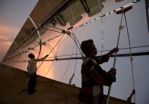(Press-News.org) DETROIT – An innovative kidney transplant technique developed by Henry Ford Hospital is credited as the first in the world to use a new set of patient safety standards coordinated by the University of Oxford in England.
The standards are being assembled and offered as a framework for developing, performing and reporting surgical innovations that, unlike new medical treatments, are not under strict regulations and control.
One historic example cited by the Oxford group was the introduction of tracheostomy as a surgical method of treating an obstruction in the trachea. The technique was clearly an innovation at the time, but was not required to go through a randomized controlled trial or other strictures required of new prescription drugs and medical procedures.
Patient safety during the learning curve posed by all surgical innovation has been a matter of concern among surgeons and related professionals for about a decade.
The Oxford group, an international collaboration of such professionals, responded with the creation of IDEAL – its recommended guidelines for Innovation, Development, Exploration, Assessment and Long-term Study.
Three years ago, Henry Ford surgeons and researchers set out to test a minimally-invasive kidney transplant cooling technique conceived by Mani Menon, M.D., chairman of Henry Ford's urology department and a pioneer in robot-assisted surgery.
They decided to develop, test and learn the technique using the IDEAL guidelines. After the study period, the innovative surgery was recently described in several peer-reviewed research papers published in European Urology, the journal of the European Association of Urology.
The Henry Ford researchers designed the study in collaboration with their counterparts at Medanta Hospital in Gurgaon, India, where pioneering work in robot-assisted kidney transplant surgery is also being conducted.
They reasoned that since minimally invasive robotic surgery has proven to be a great benefit to healthy kidney donors, it might also be a boon to the ill and fragile transplant recipients who are at greater risk of complications.
But they noted British research in 1971 showed that kidney function was partially impaired in recipients if blood flow was interrupted for longer than 30 minutes during transplant.
Dr. Menon's concept was to address that hazard by cooling both the donor kidney and the transplant site with sterile ice slush in hopes of increasing the amount of time in which they could safely learn and perfect the robot-assisted surgery.
When their study period was over, healthy kidneys had been successfully transplanted in 50 recipients using the new technique at Medanta Hospital.
Akshay Sood, M.D., of Henry Ford's Vattikuti Urology Institute and a principal in the research, said he hopes that the successes - achieved by using the IDEAL guidelines - will encourage other transplant teams to try the new technique.
"To the best of our knowledge, this is the first study to utilize the IDEAL model systematically from conception through development of a new technique," Dr. Sood said. "We found the IDEAL framework to be extremely conscientious to both the needs of the patients and the innovators."
Peter McCulloch, chairman of the IDEAL Collaboration, commended the Henry Ford research team in a recent editorial on the Oxford group's website.
"This is exciting news," McCulloch wrote. "We agree with Dr. Sood that his team is, as far as we are aware, the first to take a surgical innovation through consecutive stages of the IDEAL Framework using the guidance provided in the Recommendations.
"The information supplied in their published articles demonstrates the benefits of this approach and we congratulate them on their pioneering work."
McCulloch further noted that "it was particularly pleasing" to see that Dr. Sood and his team clearly showed how patient safety was integral to the development and use of the kidney transplant cooling technique.
The now-proven procedure will soon be available at Henry Ford Health System.
INFORMATION: END
Henry Ford Hospital cited: World's first surgical innovators for patient safety standards
2014-04-07
ELSE PRESS RELEASES FROM THIS DATE:
Tissue testing during breast cancer lumpectomies
2014-04-07
ROCHESTER, Minn. — Unique laboratory testing during breast cancer lumpectomies to make sure surgeons remove all cancerous tissue spares patients the need for a repeat lumpectomy in roughly 96 percent of cases at Mayo Clinic in Rochester, a success rate much higher than the rate nationally, a Mayo study shows. During the years reviewed, 13.2 percent of breast cancer lumpectomy patients nationally had to return to the operating room within a month of their initial surgery, compared to 3.6 percent at Mayo in Rochester, which uses a technique called frozen section analysis ...
Gene sequencing project discovers mutations tied to deadly brain tumors in young children
2014-04-07
(MEMPHIS, TENN. - April 6, 2014) The St. Jude Children's Research Hospital-Washington University Pediatric Cancer Genome Project has identified new mutations in pediatric brain tumors known as high-grade gliomas (HGGs), which most often occur in the youngest patients. The research appears today as an advance online publication in the scientific journal Nature Genetics.
The discoveries stem from the most comprehensive effort yet to identify the genetic missteps driving these deadly tumors. The results provide desperately needed drug development leads, particularly for ...
Renewable energy market share climbs despite 2013 dip in investments
2014-04-07
Frankfurt / New York, 7 April 2014 – Renewable energy's share of world electricity generation continued its steady climb last year despite a 14 per cent drop in investments to US$214.4 billion, according to a new report released today.
According to Global Trends in Renewable Energy Investment 2014 – produced by the Frankfurt School-UNEP Collaborating Centre for Climate & Sustainable Energy Finance, the United Nations Environment Programme (UNEP) and Bloomberg New Energy Finance — the investment drop of $US35.1 billion was partly down to the falling cost of solar photovoltaic ...
US schoolchildren exposed to arsenic in well water have lower IQ scores
2014-04-07
NEW YORK (April 7, 2014)—A study by researchers at Columbia University reports that schoolchildren from three school districts in Maine exposed to arsenic in drinking water experienced declines in child intelligence. While earlier studies conducted by the researchers in South Asia, and Bangladesh in particular, showed that exposure to arsenic in drinking water is negatively associated with child intelligence, this is the first study to examine intelligence against individual water arsenic exposures in the U.S. Findings are reported online in the journal, Environmental ...
Twitter use linked to infidelity and divorce, MU study finds
2014-04-07
COLUMBIA, Mo. – Twitter and other social networking services have revolutionized the way people create and maintain relationships. However, new research shows that Twitter use could actually be damaging to users' romantic relationships. Russell Clayton, a doctoral student in the University of Missouri School of Journalism, found that active Twitter users are far more likely to experience Twitter–related conflict with their romantic partners. Clayton's results showed that Twitter-related conflict then leads to negative relationship outcomes, including emotional and physical ...
No evidence of AD-associated changes in adolescents carrying genetic risk factors
2014-04-07
Amsterdam, NL, April 7, 2014 – Two studies published in the Journal of Alzheimer's Disease indicate that some of the pathologic changes associated with Alzheimer's disease in older individuals are not apparent in young people who carry the apolipoprotein (APOE) genetic risk factor for developing the disease. In the first study, no differences were found in hippocampal volume or asymmetry between cognitively normal adolescent carriers and non-carriers of the ApoE ɛ4 or ɛ2 allelles. The second study reports no differences in plasma concentrations of amyloid-β ...
Parental obesity and autism risk in the child
2014-04-07
Several studies have looked at possible links between maternal obesity during pregnancy and the risk of developmental disorders in the child. However, paternal obesity could be a greater risk factor than maternal obesity, according to a new study from the Norwegian Institute of Public Health.
As the first researcher to study the role of paternal obesity in autism, Dr. Pål Surén emphasises that this is still a theory and requires much more research before scientists can discuss possible causal relationships.
"We have a long way to go. We must study genetic factors ...
Fatty acid composition in blood reflects the quality of dietary carbohydrates in children
2014-04-07
Recently published research in the University of Eastern Finland found that fatty acid composition in blood is not only a biomarker for the quality of dietary fat but also reflects the quality of dietary carbohydrates. For example the proportion of oleic acid was higher among children who consumed a lot of candy and little high-fibre grain products. Earlier studies on the topic have mainly concentrated on the association of the quality of dietary fat with fatty acid composition in blood. In the present study, the association of the quality of dietary carbohydrates with ...
Why do we get allergies? The science of springtime sniffling and sneezing (video)
2014-04-07
WASHINGTON, April 7, 2014 — Spring has sprung, and with it comes blooming flowers, shorts and t-shirts and, for the millions who suffer from allergies, a runny nose, puffy eyes and general misery. In the American Chemical Society's (ACS') latest Reactions video, we explain the science behind the allergies that spoil spring for so many people. The video is available at http://youtu.be/vFZlxQU0Pyk.
INFORMATION:
Subscribe to the series at Reactions YouTube, and follow us on Twitter @ACSreactions to be the first to see our latest videos.
The American Chemical Society ...
Health benefits of 'green exercise' for kids shown in new study
2014-04-07
Children who are exposed to scenes of nature while exercising are more likely to experience health-enhancing effects after activity, according to a Coventry University study published this week in the International Journal of Environmental Research and Public Health.
Sports science academics in the University's Department of Applied Sciences and Health asked kids aged 9-10 years to complete a series of 15 minute moderate intensity cycling activities – one whilst viewing a video of a forest track synced to the exercise bike and another with no visual stimulus.
The researchers ...

